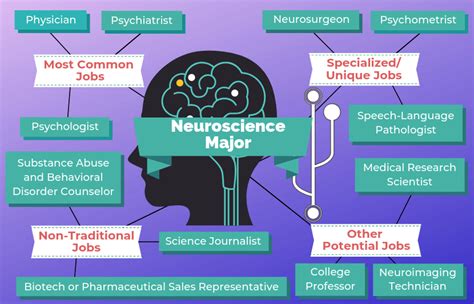Introduction

Neuroscience, the study of the nervous system and brain, has emerged as a rapidly growing field with a plethora of career opportunities. With advancements in technology and a greater understanding of the brain’s complexity, graduates with neuroscience degrees are highly sought after by various industries. This article delves into the diverse range of jobs available to individuals with a neuroscience degree, providing insights into their roles, responsibilities, and career paths.
Research
Research Scientist
- Conducts experiments to study the structure, function, and development of the nervous system.
- Publishes findings in scientific journals and presents at conferences.
- Collaborates with other researchers and scientists to advance the field of neuroscience.
Academic Professor
- Teaches undergraduate and graduate students about neuroscience.
- Conducts research in a specific area of neuroscience.
- Mentors students and provides guidance on research projects.
Clinical
Neurologist
- Diagnoses and treats disorders of the nervous system, including stroke, epilepsy, and Parkinson’s disease.
- Prescribes medications and recommends treatment plans.
- Monitors patients’ progress and provides ongoing care.
Neurosurgeon
- Performs surgical procedures on the brain and nervous system.
- Treats brain tumors, spinal cord injuries, and other neurological conditions.
- Collaborates with other healthcare professionals to provide comprehensive care.
Neuropsychologist
- Assesses and treats cognitive, behavioral, and emotional disorders related to brain injuries or neurological diseases.
- Develops treatment plans and provides therapy to improve cognitive functioning.
- Works with patients and their families to manage the challenges of neurological conditions.
Industry
Neuroscience Engineer
- Designs and develops devices and technologies that help us understand and treat brain disorders.
- Collaborates with scientists, engineers, and clinicians to create innovative solutions.
- Uses computational models and data analysis to study brain function.
Pharmaceutical Scientist
- Researches and develops new drugs to treat neurological diseases.
- Conducts clinical trials to evaluate the safety and efficacy of new treatments.
- Works closely with healthcare professionals to ensure the effective use of medications.
Data Analysis
Neuroscience Data Analyst
- Analyzes large datasets of neuroimaging data to identify patterns and trends.
- Develops statistical models and machine learning algorithms to interpret data.
- Collaborates with researchers and clinicians to gain insights into brain function and disease.
Education
Neuroscience Educator
- Develops and teaches neuroscience courses at schools and universities.
- Inspires students to pursue careers in neuroscience.
- Creates engaging and interactive learning experiences for students of all ages.
Other
Scientific Writer
- Writes and edits scientific articles, reports, and grants in the field of neuroscience.
- Disseminates research findings to a wider audience, including scientists, clinicians, and the general public.
- Promotes awareness and understanding of neuroscience-related topics.
Career Outlook and Salary Expectations
According to the Bureau of Labor Statistics, the median annual salary for neuroscience researchers is $100,090, while the median annual salary for physicians and surgeons is $208,000. The job outlook for neuroscience professionals is expected to grow faster than average, with the increasing prevalence of neurological disorders and advancements in technology driving the demand for qualified individuals.
Common Mistakes to Avoid
- Not specializing early enough. Neuroscience is a broad field, and it is important to identify a specific area of interest and specialize in it. This will increase your competitiveness in the job market.
- Underestimating the importance of soft skills. While technical skills are essential, soft skills such as communication, teamwork, and critical thinking are also highly valued by employers.
- Failing to build a professional network. Attend industry events, join professional organizations, and connect with professionals in the field to expand your network.
- Not keeping up with the latest research. Neuroscience is a rapidly evolving field, and it is crucial to stay informed about the latest advancements through reading journals and attending conferences.
- Giving up too easily. Neuroscience is a challenging field, but it is also incredibly rewarding. Don’t give up if you face setbacks, and seek support from mentors, colleagues, and friends.
Conclusion
A neuroscience degree opens doors to a diverse range of careers that are both stimulating and impactful. By understanding the various job opportunities available and avoiding common pitfalls, individuals with a neuroscience degree can position themselves for success in this exciting field. As the frontiers of neuroscience continue to expand, the demand for skilled professionals will remain strong, providing ample opportunities for those who are passionate about studying the brain’s potential.
